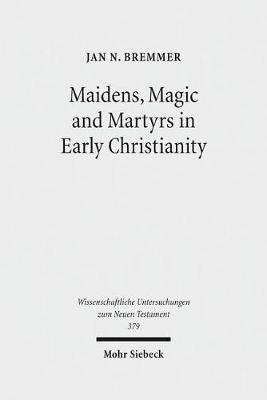Wissenschaftliche Untersuchungen zum Neuen Testament
2 primary works
Book 379
In this work, Jan N. Bremmer aims to bring together the worlds of early Christianity and those of ancient history and classical literature - worlds that still all too rarely interlock. Contextualising the life and literature of the early Christians in their Greco-Roman environment, he focusses on four areas. A first section looks at more general aspects of early Christianity: the name of the Christians, their religious and social capital, prophecy and the place of widows and upper-class women in the Christian movement. Second, the chronology and place of composition of the early apocryphal Acts of the Apostles and Pseudo-Clementines are newly determined by paying close attention to their doctrinal contents, but also, innovatively, to their onomastics and social vocabulary. The author also analyses the frequent use of magic in the Acts and explains the prominence of women by comparing the Acts to the Greek novel. Third, an investigation into the theme of the tours of hell suggests a new chronological order, shows that the Christian tours were indebted to both Greek and Jewish models, and illustrates that in the course of time the genre dropped a large part of its Jewish heritage. The fourth and final section concentrates on the most famous and intriguing report of an ancient martyrdom: the Passion of Perpetua. It pays special attention to the motivation and visions of Perpetua, which are analyzed not by taking recourse to modern theories such as psychoanalysis, but by looking to the world in which Perpetua lived, both Christian and pagan. It is only by seeing the early Christians in their ancient world that we might begin to understand them and their emerging communities.
Book 433
In this wide-ranging work on Greek religion and mythology, Jan N. Bremmer brings together his stimulating and innovative articles, which have all been updated and revised where necessary. In three thematic sections, he analyses central aspects of Greek religion, beginning with the gods and heroes and paying special attention to the unity of the divine nature and the emergence of the category 'hero'. The second section begins with a discussion of the nature of polis religion, continues with various facets, such as seers, secrecy and the soul, and concludes with the influence of the Ancient Near East. The third section studies human sacrifice and offers the most recent analysis of the ideal animal sacrifice, combining literature, epigraphy, iconography, and zooarchaeology. Regarding human sacrifice, it concentrates on the famous cases of Iphigeneia and the werewolves of Mount Lykaion. The fourth and final section investigates key elements of Greek mythology, such as the definition of myth and its relationship to ritual, and ends with a brief history of the study of Greek mythology. The multi-disciplinary approach and rich footnotes make this work a must for anybody interested in Greek religion and mythology.

